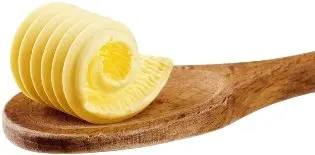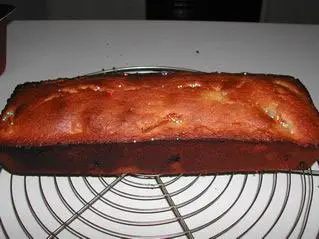Butter doesn't make you fat, unless you eat too much of it.

Whenever I'm discussing cooking and recipes, there is one idea which comes up frequently, like this: "Oh no! But that's got butter in it" (I should add, for the sake of accuracy, that this is something I hear more frequently from women, who are almost all concerned with keeping their figure).
This immediately gives me the impression that butter is THE ingredient that should be banished from the kitchen, and it has been banned in a lot of so-called "healthy cooking" or "slimming" recipes, often being replaced by oil, preferably olive.
This immediately gives me the impression that butter is THE ingredient that should be banished from the kitchen, and it has been banned in a lot of so-called "healthy cooking" or "slimming" recipes, often being replaced by oil, preferably olive.
45 K 4.5/5 (22 reviews)
Keywords for this post:ButterDietWeightFatHealthVitaminLast modified on: March 26th 2012
Butter doesn't make you fat, unless you eat too much of it.
Whenever I'm discussing cooking and recipes, there is one idea which comes up frequently, like this: "Oh no! But that's got butter in it" (I should add, for the sake of accuracy, that this is something I hear more frequently from women, who are almost all concerned with keeping their figure).
This immediately gives me the impression that butter is THE ingredient that should be banished from the kitchen, and it has been banned in a lot of so-called "healthy cooking" or "slimming" recipes, often being replaced by oil, preferably olive.
As I am a fan of olive oil – I use it every day – that suits me fine, but I'm not ready to abandon butter under the pretext that because it is fat, it makes you put on weight.
Allow me then to list a few of the benefits of butter, apart from its nutritional qualities (notably Vitamin A), as its disadvantages are well known:
- Butter contains around 80% fat ; if that seems like a huge amount and you prefer the idea of oil, remember that oil is 100% fat!
- Great chefs often say, quite rightly, that butter "fixes" flavours. So adding a small amount of butter, even if it is not the main type of fat in the dish, will improve the overall flavour. Think of fresh garden peas, boiled quickly in salted water, with a knob of butter melted over them before serving – delicious!
- Butter can provide the fat needed for cooking, but in the process it adds its own subtle flavour, and this is closely tied to the quality of butter you use. It is true that this is also the case for olive oil, but not at all for sunflower or groundnut oil, which are fats with a neutral flavour.
- You will not put on any more weight through eating butter than any other fat; it's an excess of butter/fat which leads to weight gain.
- Butter can be eaten cold and can be used hot in cooking, but with certain precautions. It only becomes indigestible when burnt (ah – that awful outmoded recipe for ray with black butter).
- Without butter, there would be no French pâtisserie (cakes and pastries), or hardly any. Replacing butter with margarine does not make a good shortcrust pastry or good french croissants (for example).
But it's not just because I live in Brittany that I owe it to myself to stay faithful to butter. It is certainly true that using too much butter is neither good for the cooking nor for health, but – as in all things – it is an excess that is bad, and only an excess. If you are worried about your figure, then eat less, or only a little, but do eat the good, proper stuff.
So there is no need to deprive yourself of using butter in cooking, or take an extreme anti-butter stance, but just use it wisely. To all lovers of good food and enthusiastic cooks (like us), it is a precious ally.
I will close with a quotation attributed (allegedly) to Paul Bocuse. He was talking to an American food critic, who remarked on the quantity of butter he used in his cooking. The chef replied, "If you don't like butter or cream, there's really no point coming to France".
This immediately gives me the impression that butter is THE ingredient that should be banished from the kitchen, and it has been banned in a lot of so-called "healthy cooking" or "slimming" recipes, often being replaced by oil, preferably olive.
As I am a fan of olive oil – I use it every day – that suits me fine, but I'm not ready to abandon butter under the pretext that because it is fat, it makes you put on weight.
Allow me then to list a few of the benefits of butter, apart from its nutritional qualities (notably Vitamin A), as its disadvantages are well known:
- Butter contains around 80% fat ; if that seems like a huge amount and you prefer the idea of oil, remember that oil is 100% fat!
- Great chefs often say, quite rightly, that butter "fixes" flavours. So adding a small amount of butter, even if it is not the main type of fat in the dish, will improve the overall flavour. Think of fresh garden peas, boiled quickly in salted water, with a knob of butter melted over them before serving – delicious!
- Butter can provide the fat needed for cooking, but in the process it adds its own subtle flavour, and this is closely tied to the quality of butter you use. It is true that this is also the case for olive oil, but not at all for sunflower or groundnut oil, which are fats with a neutral flavour.
- You will not put on any more weight through eating butter than any other fat; it's an excess of butter/fat which leads to weight gain.
- Butter can be eaten cold and can be used hot in cooking, but with certain precautions. It only becomes indigestible when burnt (ah – that awful outmoded recipe for ray with black butter).
- Without butter, there would be no French pâtisserie (cakes and pastries), or hardly any. Replacing butter with margarine does not make a good shortcrust pastry or good french croissants (for example).

But it's not just because I live in Brittany that I owe it to myself to stay faithful to butter. It is certainly true that using too much butter is neither good for the cooking nor for health, but – as in all things – it is an excess that is bad, and only an excess. If you are worried about your figure, then eat less, or only a little, but do eat the good, proper stuff.
So there is no need to deprive yourself of using butter in cooking, or take an extreme anti-butter stance, but just use it wisely. To all lovers of good food and enthusiastic cooks (like us), it is a precious ally.
I will close with a quotation attributed (allegedly) to Paul Bocuse. He was talking to an American food critic, who remarked on the quantity of butter he used in his cooking. The chef replied, "If you don't like butter or cream, there's really no point coming to France".
Lasts posts
XO Cognac Explained: Meaning, Aging, and Flavor Profile
XO Cognac always goes beyond the labels on the bottle: it is often associated with tradition and quality. You get to appreciate the artistry, character and ageing process when you understand what defines this smooth Cognac. The section below tackles everything about XO Cognac, from complex flavour...January 28th 2026176 Sponsored article
Butter vs. grease
We often read in a recipe where a pastry is put into a mould that, just before pouring, the mould should be buttered or greased. But what's the difference between these 2 terms?December 1st 20252,3145
Getting out of the fridge early
Very often when you're cooking, you need to take food or preparations out of the fridge, to use them in the recipe in progress. There's nothing tricky about this: you just take them out of the fridge and use them, usually immediately, in the recipe. But is this really a good method?November 24th 20251,5235
Who's making the croissants?
When you look at a bakery from the outside, you naturally think that in the bakery, the bakers make the bread, and in the laboratory, the pastry chefs make the cakes. It's very often like that, with each of these professions having quite different ways of working, but sometimes there's also one...November 23th 20251,383
Oven height
When we put a dish or cake in the oven, we naturally tend to put it on the middle shelf, and that's what we usually do. But in some cases, this position and height can be a little tricky, so let's find out why.October 8th 20254,3345
Other pages you may also like
The power of sayings and beliefs in the kitchen
One day, in the comments on the recipe for beaten egg whites, a young woman asked if you could beat egg whites stiff while having a period, as a friend had told her it wasn't possible. Sometime later another person commented that for mayonnaise it had been (get this!) scientifically proven that a...February 6th 201152 K4.4
Well-cooked meat
Have you ever noticed that if you like your meat well done, it invites strange looks? For instance, in a restaurant, when asked “How would you like that cooked?” If you reply, “Well done,” it is almost as if you are swearing….May 21th 201134 K 14.4
Fruits which can ruin your jelly
There are many ways of making a fruit mousse, but one of the simplest is to prepare a fruit jelly (basically a fresh fruit coulis with gelatine) and then mix this jelly before it sets completely with whipped cream. The result is perfect for filling a charlotte, for example. But do beware;...March 6th 201379 K4.0
Candied fruits: don't get ripped off
Do you like candied fruit? You might like to nibble a handful or add it to a recipe, like a classic fruit cake or delicious Italian specialities like panettone or sicilian epiphany pie.June 21th 201769 K 24.2
The mock CAP baker's certificate exam
The next instalment in my life as an apprentice baker at the French INBP professional school. I’m now halfway through training and it’s still as exciting as ever, and exhausting – but maybe I’m just getting old, or both… Anyway, a few days ago we had to go through the mock CAP exam. A sort...May 1st 201821 K4.4
Post a comment or question
Follow this page
If you are interested in this page, you can "follow" it, by entering your email address here. You will then receive a notification immediately each time the page is modified or a new comment is added. Please note that you will need to confirm this following.
Note: We'll never share your e-mail address with anyone else.
Alternatively: you can subscribe to the mailing list of cooling-ez.com , you will receive a e-mail for each new recipe published on the site.









